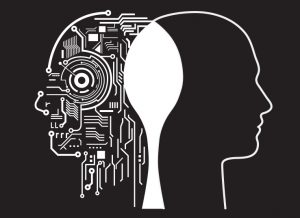Artificial Intelligence: a savior, not destroyer
December 20, 2017
Even with booming economies and higher standards of living around the world, the future is not promising. While the amount of usable resources stays relatively constant, the human population is increasing at an exponential rate. Additionally, our technological advancements can only keep us alive for so long on Earth because of their harmful drawbacks. The increasing carbon footprint during the last two centuries is evidence of climate change, a catastrophic consequence of continual human industrialization.
This is where artificial intelligence (AI) comes in play. Computer scientists and roboticists alike have been studying the field of AI for several decades, but only recently have we seen real-world applications; Apple’s Siri, the self-driving car, and chatbots are just a few. AI allows certain software and machines to perform “intelligent” tasks, which boil down to gathering data and making insights.
Farming, which uses the most land out of any major industry, is something that can be revolutionized for the better. With AI and data science techniques, farmers can monitor fields, calculate irregular plant growths, and receive other analytics without having to actually take any measurements in the field. Instead, using indirect evidence like water levels and satellite imagery can help farmers more efficiently produce a higher number of crops. As population grows rapidly, the Food and Agriculture Organization of the United Nations estimates that farmers will need to grow 50% more crops by 2050. Saving land for an increasing amount humans to build homes will also be very crucial.
Aside from farming, robots like NASA’s Mars Rover use AI techniques to traverse places humans cannot reach. Through computer vision and machine learning, robots can scan their surroundings and accurately determine the situation. If the robot comes across a unique rock, for example, it will stop and analyze the rock, maybe even deducing what is special about it.
Many people worry AI is a danger to humans and can motivate itself to take over the world. As ridiculous as it sounds, it is a common notion; what these people don’t understand, however, is that AI doesn’t have to be nearly as extreme as some movies make it out to be. Currently, in our daily lives, we often encounter what’s known as soft AI. Applications like Siri and Amazon Alexa are examples of soft AI, which have been trained using an abundance of models and data. The end result is a machine or software which behaves similar to humans, but beyond a certain point, these AIs do not know how to respond. Next time you come across an AI tool like Alexa, try conveying emotion to it. You’ll soon be able to relax knowing that you are not talking to a human being.
Such a tool, one that completely thinks, learns, and responds like a human, is classified as hard AI. This is essentially the worst nightmare for many folks. Hard AI could have the power to observe and recognize things even humans don’t identify; it could begin learning English and Mandarin and end up knowing 25 other languages; hard AI could even be smart enough to understand the most fundamental laws regarding the universe and then use that knowledge to build a whole new universe just for their kind.
But we do not know for sure what hard AI really can do, and that is because it does not exist yet, and it will not exist for many (human) lifetimes. Hard AI technology is currently far from being developed and remains to be unreasonable for this main reason: the human brain is very complex. To this day scientists do not even fully understand how the brain thinks and learns. In order to simulate the billions of processes of a brain in a computer, much more research and development into computing and electronics is needed.
AI currently allows us to gather data and make insights that are extremely difficult for humans to do. It gives machines the power to drive itself, explore other planets, and perform other “intelligent” tasks, but beyond a certain extent AI cannot reason and understand the way humans do. Although AI taking over the world and decimating humans along the way makes for entertaining science-fiction films, don’t worry about it! Just grab some popcorn, tell Alexa to play the movie, and relax.









